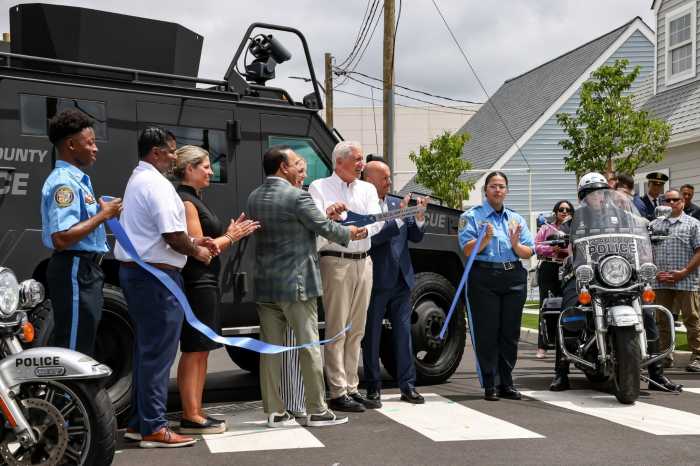Law to Stop Loitering on Forest Avenue in Locust Valley to Be Challenged as a “Right to Work” Issue
At the Oyster Bay Civic Association meeting Luz Torres, director of the Centro Cultural Hispanica (CCU, the Hispanic Cultural Center) told the members that she is getting together a coalition to fight the Town of Oyster Bay’s new ordinance prohibiting streetside solicitation. The reason, she said, is because everyone has the right to work, and the new law inhibits that right.
The ordinance was created in response to residents in the Locust Valley “numbered streets” along Forest Avenue where workers stand on the street corners waiting for people to drive up and hire them for work, often for construction. Residents said they feel their neighborhood has been invaded and it is no longer the “safe” suburban community they moved into and settled their families into.
At the town board hearing on May 26, many national groups actually threatened the town government saying that anti-solicitation laws have been fought throughout the country and won. In this case the law is against the solicitor and not the solicitee.
A town press release which defined the law as prohibiting solicitation from sidewalks and streets was approved by the Oyster Bay Town Board, and according to Town Supervisor John Venditto, “Pedestrians engaging in solicitation from sidewalks and streets cause danger not only to themselves, but to drivers and other pedestrians.
“They also obstruct the free flow of traffic. This ordinance is aimed at stopping the practice of solicitation for the safety of those who are soliciting, as well as drivers and pedestrians whose safety is compromised by the distraction they cause.
“Under the ordinance, it is unlawful for any person on any sidewalk, curb, road or median to stop or attempt to stop a vehicle to solicit employment. It is also unlawful for the driver of any vehicle to stop, or stand, in any area that is designated either as a traffic lane or as a no standing or stopping zone for the purposes of accepting or attempting to accept any solicitation from a pedestrian. Furthermore, it is unlawful for an occupant of any vehicle to solicit employment from a pedestrian. ”
During that meeting there were suggestions that a “hiring hall” or building be assigned for use of the workers somewhere in the commercial district of Locust Valley. Supervisor Venditto said at the time that he didn’t want to accept the obligations associated with creating that type of space. There is a “shape up center” in Glen Cove that is very successful. Workers are hired from there, and those that do not find jobs are offered classes in English and have accessibility to computers.
At the civic meeting, Ms. Torres, who was one of the founders of the CCH about 12 years ago, talked about the successes of the group. In 1999 they created CARE, the after school program at the Roosevelt Elementary School in space donated by the district. The CCH pays the salaries of the workers. Three years later the program was expanded to the Vernon School.
Ms. Torres said the CCH steering committee has worked to create a strong community group by having the members themselves involved in fund raising activities which are also social events to bring the people together.
The CCH runs the ESL program in the district. At one time it was run by the Oyster Bay-East Norwich School District many years ago, but when they changed the number of hours for each session from three to two hours, teachers were not willing to sign up to teach the classes; the students didn’t have enough time to fulfill the mission of the classes (language, culturation, and socialization) and they stopped being offered. Several years ago, when Luz Torres appeared before a town board meeting to ask if signs in front of the LIRR station be written in Spanish, Supervisor Venditto said two things. He said “no” to the bi-lingual signs and instead offered to financially support ESL classes in Oyster Bay. Those classes now run by the CCH are held at times more convenient to the workers, many of whom work in restaurants. It is easier for them to be in classes during the day than at night when work is available. About 50 people attend the ESL classes. “It is very successful, and great,” said Ms. Torres.
CCH Office
The CCH has an office donated to them in the Christ Church parish hall building that is open 9 a.m. to 5 p.m. to help Spanish people with problems. They include employment problems; domestic violence; child support, etc. Ms. Torres said they don’t solve the problems, but lead the client to where they can solve their own problem, so that they learn and grow.
One of those projects has been to see that the workers are paid minimum wage in restaurants as well as receiving pay for overtime work. They have been successful in doing that in Oyster Bay. Now there are no complaints, she said.
As for child support she said they take the people to court. “They have to learn how things are done here and that they have a right to live a nice life here,” said Ms. Torres.
She has also involved the members in community events to make them part of the fabric of Oyster Bay. They have participated in the downtown cleanup efforts. They have taken members to see the Statue of Liberty and most recently to the Bronx Museum, by bus. “Each person paid for their ticket. They have to find the funds,” she said. They also took part in several Oyster Festivals, including this past one.
In today’s economy the members are feeling the financial pinch and the CCH has helped create a mini-industry with a group of people making piñatas. “They have learned how to use glue guns and make the piñatas. The newest design is a turkey,” said Ms. Torres. She brought the turkey piñata to the civic meeting. The piñatas are available on their website, www.friendlypinatas.com.
Ms. Torres said the CCH brings money into the town via grants they have received from NYS Senator Carl Marcellino, the Town of Oyster Bay, the Community Foundation of Oyster Bay and Catholic Charities. “We bring a lot of money into the town for services,” she said.
Ms. Torres is considered a community leader by the town and she has participated in the Hamlet Plan and has been a member of the TR Park Advisory Committee.
A Right to Work
Having given people a look at the CCH she turned to the new anti-loitering law of which she said, “Everyone has the right to look for a job. I went to the hearing at town hall to express our concerns and said we are against it. It is not good for the children if the people can’t get jobs. It can result in poor nutrition. Children are hurt as a result,” she said.
Ms. Torres said that at the town board meeting the supervisor said there would be a meeting with Pastor Allan Ramirez of the Brookville Reformed Church, an activist in the Spanish community; Pascual (Pat) Blanco of the La Fuerza Unida in Glen Cove; and Ms. Torres. She said, “Five months after the meeting and they have approved the law without any meetings with us. The people are just looking for jobs.”
She said the worst part of the issue was when she was asked to come to town hall and was asked to translate the new ordinance into Spanish, something she has done for other things before. In this case, it was for a law which the CCU was opposed to. She said they told her to “Bear in mind that they pay for the ESL classes and that we should translate the law. This is not right, this is an insult.”
She said the decision not to do the translation was made by her board of “nine strong women” with families in town. “It was against our ethics to do it; it was against our people. We are getting ready to create a coalition in Nassau County to fight the law. Not only in Oyster Bay and Locust Valley but in the whole town. We will work to defeat the law. We think everyone has a right to find a job.”
Piñata Party – A Mini Industry
She also mentioned their event at Capitol One Bank, a piñata party held on Oct. 9. Members attended workshops and training sessions designed to teach not only the folk craft but also to learn business skills such as marketing. Their goal is to one day have their own small business. It was all done thanks to Branch Manager Bridget Betancourt and Assistant Branch Manager Lilliam Escamilla who set up and managed the beautiful displays at the bank.
“This is a big thing! Our organization is growing a lot.” She announced that at a breakfast event of the Community Foundation of Oyster Bay, they announced that the CCH is one of 10 groups in the United States that will be trained by a Boston Community Organization.
She also thanked St. Dominic’s for the use of their social room and the Di Silveri Center; the First Presbyterian Church; and Christ Church for their hospitality.
One of the ongoing problems in the Spanish community she said is isolation. Many work in homes and at jobs where they can’t socialize. Going home to be alone is depressing and there is a need to see other people. “Everyone has the right to socialize,” she said, as an explanation for their standing outside on the street. When asked if the people she is representing are illegal aliens she said, “My job is not immigration. I cannot ask people if they have papers.” She did say that they have citizenship classes and encourage citizenship.
Attorney Adam Mandelbaum asked if there had been any people arrested as a result of the current law. “It is being enforced?” No one at that time had an answer.
Ms. Torres said the problem of loitering for jobs does not occur in Oyster Bay. She said the people go to the bodegas to look for jobs, and said, “It is not enforced as yet.” The ordinance has to be first translated into Spanish, she said.
Attending the meeting was Police Officer Brian Pallilo, who works as part of the 2nd Precinct as a Problem Oriented Policeman, and speaks Spanish. He said that the police need to have the legality of the new law defined for the officers before they arrest anyone. He said the police department is looking into the issue.
Bike Safety Fliers
OBCA board member Rob Brusca said that the CCH has helped them translate fliers about bike safety created by the OBCA and the East Norwich Civic Association. “It is for bike safety, especially for the Hispanic guys who often ride on the sidewalk and ride at night, against the traffic. It is a flier with several bullet items giving traffic safety rules.
“Mr. Visentin, at Visentin Bikes on Pine Hollow Road, is giving out free reflective lights along with the flier and offering a 10 percent discount off on a reflective vest,” he said. More publicity about the project is forthcoming, he said. The flier written in Spanish is being sent by email and will be in local restaurants, he said.
The joint civics have also sponsored fliers in Spanish, translated by Cinthia Scavone at the CCH for landlords as reminders for garbage pickups.
U.S. Census Count
Ms. Torres also said that the CCH is getting money to work with the U.S. Census bureau to count the hamlet. The project is being coordinated by Cinthia Scavone of CCH.
The census count is used to determine each state’s congressional representation for the next 10 years and to establish new boundaries for congressional, State legislative and many local government districts. The federal government uses census data to allocate more than $400 billion in federal funds annually for community programs and services, such as education, housing and community development, health care, transportation and more.
State and local governments use census information for planning and to allocate funds for new school construction, libraries and other public buildings, highway safety and public transportation systems, new roads and bridges, location of police and fire departments and many other projects.
Governor David A. Paterson said in a press release that “Federal estimates suggest that more than 202,000 New Yorkers were not counted in the 2000 census – we can and we must do better.”
That is the reason for the outreach to reduce the undercount number.
Ms. Scavone is also training people for the work of counting Oyster Bay, East Norwich, Bayville and Locust Valley. They are meeting with a census representative on Saturday, Nov. 28 in the St. Dominic Social Room for further instructions.
At the ENCA meeting there was some interchange in relation to the “loitering”. Ms. Torres said lately they were getting some racist comments but said, “That is life. It was the same for the Irish, the Italians and now the latest immigrants are suffering with that.”
Judy Barnett, OBCA board member said as the daughter of German immigrants, that she didn’t like people standing on street corners looking for jobs, that her family went to agencies for jobs. With 10 percent of the population out of work, how would it be if that were the norm – standing on street corners.
Ms. Torres said, “The whole community has to find a solution. Where can we put the people?”


































